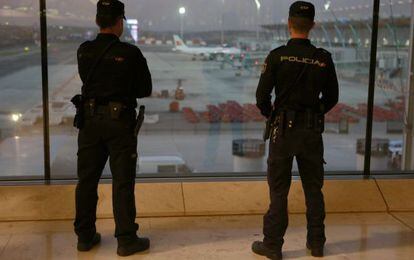US wants to station its own armed border officials at Madrid airport
Washington seeking to check passengers boarding flights from Spain to its territory


The United States has asked Spain for permission to install officers from its own Customs and Border Protection agency at Adolfo Suárez Madrid–Barajas Airport to check for possible terrorism suspects boarding flights to the US.
The Spanish government has yet to officially respond to the request, but has expressed its concerns to Washington that, given that the agents would be armed and hold diplomatic immunity, the measure would involve a handing over of national sovereignty.
The US already has three government officials in Madrid checking the documentation of passengers
A 2009 agreement means the US already has three government officials in Madrid checking the documentation of passengers boarding flights not only to the United States but, as EL PAÍS has revealed, also those flying over US territory.
Although these officials have the power to prevent passengers considered a security risk from boarding a flight, they are unable to search or arrest suspects on Spanish soil, as Washington is now requesting.
The installation of a US Customs and Border Protection checkpoint at Madrid airport would mean submitting passengers to the same stringent luggage and body searches they would undergo upon their arrival in the United States, which would in theory mean they would not have to undergo further checks once on US soil – though Washington reserves the right to impose more.
The most controversial issue, however, remains the request for the officers to be armed and enjoy diplomatic immunity, meaning they would not be accountable to Spanish justice if involved in any incident.
The Spanish government has already expressed its reservations to Washington and is now consulting with the foreign, interior and public works ministries in order to formulate its definitive response.
Spain’s AENA airport authority is also not believed to be enthusiastic about the proposal over fears that the extra security measures would bring the same long lines now seen at US airports to Madrid.
The request forms part of the US’s so-called preclearance program, which was first set up in Canada in 1952 and now encompasses airports in Ireland, the Caribbean and, since 2014, the United Arab Emirates. In May of this year Washington issued requests to extend the program to 10 airports in nine other countries – Belgium, the Netherlands, the UK, Sweden, Norway, Spain, Japan, Turkey and Dominican Republic – though it remains to be seen how many of them will agree.
The request is part of the US preclearance program, which began in Canada in 1952 and now encompasses airports in Ireland and the Caribbean
In Spain the US proposal gives rise to several problems. The first is a legal one, given that the agreement ought to take the form of an international treaty ratified by parliament. The second relates to national dignity – Spain might not be able to accept such an accord without a clause giving it the right to reciprocate, even if it never intends to take up that right. The third involves the airlines, which might be reluctant to back an agreement if they cannot guarantee passengers that they will not be subjected to further checks upon their arrival in the United States.
English version by Nick Funnell.










































